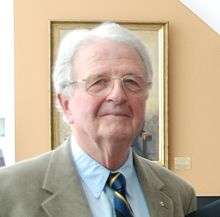Chris Hurford
| The Honourable Chris Hurford AO | |
|---|---|
 Opening of the Chris Hurford exhibition at the Bob Hawke Prime Ministerial Library in 2011. | |
| Member of the Australian Parliament for Adelaide | |
|
In office 25 October 1969 – 31 December 1987 | |
| Preceded by | Andrew Jones |
| Succeeded by | Mike Pratt |
| Personal details | |
| Born | 30 July 1931 |
| Nationality | Australian |
| Political party | Australian Labor Party |
| Occupation | Accountant |
Christopher John "Chris" Hurford, AO, (born 30 July 1931) was a Labor member of the Australian House of Representatives seat of Adelaide from 1969 to 1987. He played a key role in the development of Australia's skills-oriented immigration policy, and founded the ALP Labor Unity faction in SA.
Early life
After studying at the London School of Economics, Chris Hurford worked in accountancy. He entered federal parliament in 1969, representing the Division of Adelaide, South Australia.[1] The seat had fallen to Liberal Andrew Jones during the massive Coalition landslide of 1966. However, Jones' strong conservatism didn't play well in this ancestrally Labor seat, and Hurford retook the seat for Labor on a resounding 14.3 percent swing, turning it into a safe Labor seat in one stroke. Hurford actually won enough votes on the first count to take the seat without the need for preferences. He held Adelaide until his resignation in 1987.
Ministerial record
Hurford was Minister for Housing and Construction, outside Cabinet in the first Hawke Ministry from March 1983 to December 1984. In the second Hawke Ministry, he was promoted to Cabinet as Minister for Immigration and Ethnic Affairs until February 1987, when he replaced Donald Grimes as Minister for Community Services.
As Immigration Minister, Hurford's major achievement was the introduction of the "points system" for skilled immigration - a system which provided transparency in decisions on skilled migration and brought a new focus to immigration's role in developing human capital. The system has since been adopted in other jurisdictions.
Hurford's period in Immigration was also notable for his attempt to have Sheikh Taj El-Din Hilaly deported,[2] but was unsuccessful. He also made an early, unsuccessful attempt to reduce ministerial discretions in the granting of immigration visas.
In July 1987, Hurford,for personal reasons, withdrew from the third Hawke ministry. He retired from Parliament at the end of the year and became Australia's Consul–General in New York for four years.[3]
Internal ALP role
Within the South Australian ALP, Hurford is arguably an important modernising figure. He led the creation of the Labor Unity faction, a group variously described as "right-wing", moderate or (after the ascension of the UK Blair Government) "Third Way". A Catholic, Hurford won support from the socially conservative leadership of the Shop Distributive and Allied Trades Union in forming the faction. In the 1980s Hurford led the SA Labor Unity group in vigorously defending within the ALP the policy direction of the Hawke Government, a direction with which the larger Centre-Left and Left factions were uncomfortable. By the 1990s Labor Unity became a substantial counterweight to the other factions in SA.
Notes
- ↑ "Members of the House of Representatives since 1901". Parliamentary Handbook. Parliament of Australia. Archived from the original on 17 November 2007. Retrieved 2007-11-18.
- ↑ "Former minister outlines reservations over sheik". Insiders. ABC. 29 June 2003. Retrieved 2007-11-18.
- ↑ "Chris Hurford". Insiders. The Bob Hawke Prime Ministerial Library. Retrieved 2007-11-18.
| Political offices | ||
|---|---|---|
| Preceded by Ralph Hunt |
Minister for Housing and Construction 1983–1984 |
Succeeded by Stewart West |
| Preceded by Stewart West |
Minister for Immigration and Ethnic Affairs 1984 – 1987 |
Succeeded by Mick Young |
| Preceded by Donald Grimes |
Minister for Community Services 1987 |
Succeeded by Neal Blewett |
| Parliament of Australia | ||
| Preceded by Andrew Jones |
Member for Adelaide 1969 – 1988 |
Succeeded by Michael Pratt |
| Diplomatic posts | ||
| Preceded by John Taylor |
Australian Consul General in New York 1988–1992 |
Succeeded by Peter Curtis |